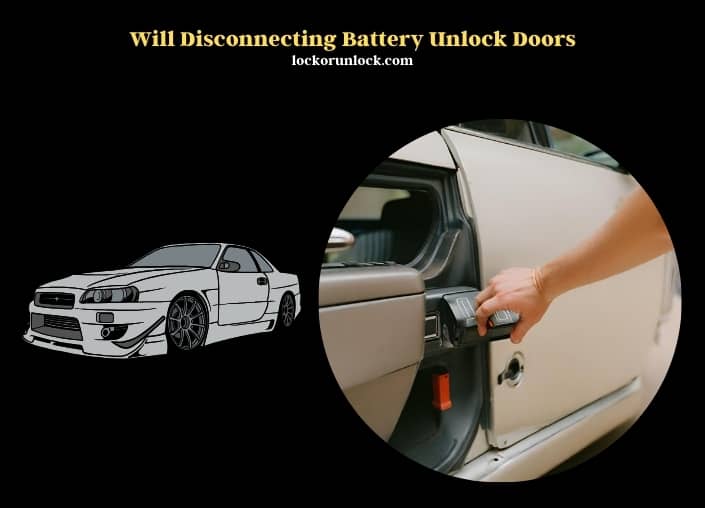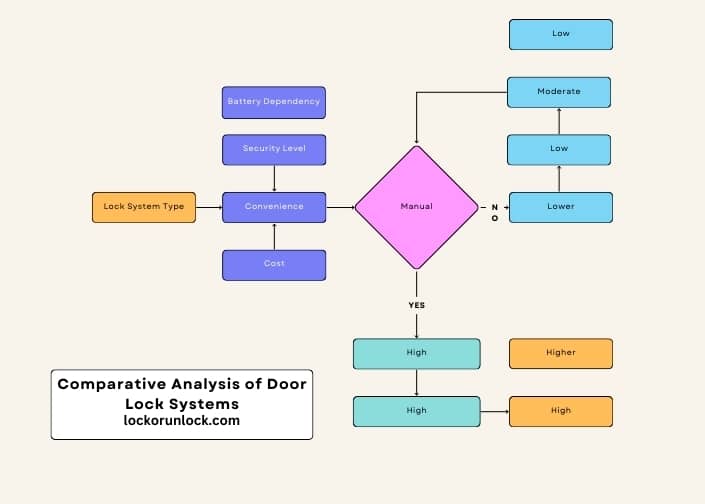Disconnecting a car battery does not universally unlock the doors. The response of the door locks to battery disconnection varies based on the vehicle’s make and model.
In modern vehicles, door locks are often part of an integrated electronic system. This system relies on the car’s electrical circuit, powered by the battery, to function correctly. In some vehicles, disconnecting the battery may deactivate the electronic locking mechanism, potentially leaving the doors unlocked. However, in other models, especially those with advanced security systems, disconnecting the battery might activate default security protocols, resulting in the doors being locked.

The impact of battery disconnection on door locks is also influenced by the type of lock system installed in the vehicle. Traditional, manual lock systems are generally unaffected by the state of the car’s battery, as they operate mechanically. On the other hand, electronic lock systems, which offer features like remote locking and unlocking, are more likely to be impacted by battery disconnection.
For vehicle owners, understanding how their car’s locking system interacts with the electrical system is crucial. This knowledge is particularly important in situations where the battery needs to be disconnected for maintenance or troubleshooting. It ensures that the vehicle remains secure and helps prevent unexpected lockouts or security breaches.
Battery Disconnection: Impact on Vehicle Door Locks
Disconnecting a car battery can have varied effects on the vehicle’s door lock mechanisms. Most modern vehicles are equipped with electronic door lock systems, which rely heavily on the car’s electrical system, powered by the battery. The role of the battery in vehicle security is pivotal. In the event of battery disconnection, automatic locking systems may fail to operate, reverting to manual operation. This shift can pose security risks, especially if the vehicle owner is unaware of the change in lock functionality.
The potential risks of disconnection include the inability to lock or unlock doors using remote controls or internal buttons. This situation is particularly problematic in emergencies or when quick access to the vehicle is necessary.
The relationship between the battery and the lock system is crucial for vehicle owners, especially those using advanced electronic security features.
Post-Disconnection Door Lock Troubleshooting
After disconnecting a car battery, owners might face several door lock issues. Common problems include unresponsive remote keys, malfunctioning central locking, and erratic behavior of the lock system. A step-by-step diagnostic guide is essential for identifying and resolving these issues. The first step usually involves checking the battery connections and ensuring they are secure and free from corrosion.
Reconnecting the battery correctly is often a simple yet effective solution. However, in some cases, the vehicle’s security system may require a reset, which can be done following the manufacturer’s guidelines. For more complex issues, professional assistance is recommended over DIY solutions, as improper handling can lead to further complications or void warranties.
Safety Measures in Battery Disconnection
Safety is paramount when disconnecting a vehicle battery. Proper disconnection techniques involve switching off all electrical components, using the right tools, and following a specific order for removing battery terminals. This process helps in avoiding electrical hazards and protecting the vehicle’s electronic systems.
The impact of battery disconnection on vehicle safety features, including door locks, is significant. In some cases, disconnecting the battery can lock the doors automatically or disable remote unlocking features. It’s essential to ensure that there is an alternative way to access the vehicle in emergencies. Vehicle owners should be aware of these aspects to prevent being locked out or unable to access their car in critical situations.
Comparative Analysis of Door Lock Systems
| Lock System Type | Manual | Electronic |
| Battery Dependency | Low | High |
| Security Level | Moderate | High |
| Convenience | Low | High |
| Cost | Lower | Higher |

This table illustrates the differences between traditional key-based systems and modern electronic systems. The impact of battery disconnection varies significantly between these systems. Manual systems, which are less dependent on the vehicle’s electrical system, are generally unaffected by battery disconnection. In contrast, electronic systems, offering higher security and convenience, can become non-functional or behave unpredictably when the battery is disconnected.
These differences is crucial for vehicle owners, especially when considering upgrades or dealing with battery-related issues. The choice between a manual and an electronic system should consider the owner’s lifestyle, vehicle usage, and preference for security versus convenience.
Best Practices for Battery Maintenance
Regular battery maintenance is essential for ensuring the longevity and reliability of the vehicle’s electrical systems, including door locks. Vehicle owners should conduct regular check-ups to identify signs of battery failure, such as dimming headlights, slow engine crank, or the battery warning light.
| Battery Maintenance Aspect | Recommended Action |
| Visual Inspection | Monthly |
| Voltage Check | Every Six Months |
| Professional Inspection | Annually |

This table provides a guideline for battery maintenance. Adhering to these practices helps in maintaining door lock functionality and overall vehicle health. Early detection of battery issues can prevent unexpected lockouts and security breaches, ensuring a smooth and safe driving experience.
FAQs
Does Battery Disconnection Reset Car Door Locks?
Disconnecting a car battery can sometimes reset the door locks, especially in vehicles with advanced electronic systems. This reset might revert the locks to their default settings, which can vary depending on the make and model of the vehicle. In some cases, the doors may lock automatically as a security measure, while in others, they might remain unlocked. It’s essential for car owners to be aware of their vehicle’s specific responses to battery disconnection to avoid unexpected lockouts or security issues.
Can Disconnecting the Battery Unlock the Doors on a Tacoma with Locking Differential?
Yes, disconnecting the battery on Tacoma models with locking differential can sometimes unlock the doors. However, it can also reset the security system and cause issues with the locking differential. It’s best to consult a professional mechanic for proper advice and assistance.
Can Disconnecting the Battery Affect Key Fob Functionality?
Disconnecting the battery can impact the functionality of key fobs. Since key fobs rely on the vehicle’s electrical system to communicate with the car, disconnecting the battery breaks this communication temporarily. After reconnection, the key fob might require re-synchronization with the vehicle’s system. This process can usually be done following simple steps outlined in the vehicle’s manual. It’s a straightforward procedure that restores the key fob’s ability to lock and unlock the doors remotely.
Is It Safe to Leave a Car Unlocked After Battery Removal?
Leaving a car unlocked after removing the battery can pose security risks. It’s advisable to ensure the vehicle is in a secure location if the doors cannot be locked due to battery disconnection. For prolonged periods without a battery, consider additional security measures like steering wheel locks or parking in a locked garage. This precaution is particularly important for vehicles with electronic lock systems that may not function without power.
What Are the Effects of Battery Disconnection on Alarm Systems?
Battery disconnection can temporarily disable car alarm systems. Most car alarms are integrated into the vehicle’s electrical system and rely on the battery for power. Disconnecting the battery will shut down the alarm system, leaving the vehicle without this layer of security. Once the battery is reconnected, the alarm system usually becomes operational again. However, some systems may require a manual reset or reactivation.
Can Manual Door Locks Be Affected by Battery Disconnection?
Manual door locks are generally unaffected by battery disconnection. These locks operate mechanically and do not depend on the vehicle’s electrical system. Therefore, even when the battery is removed, manual locks should function as usual. This feature can be particularly useful in situations where the battery is dead or disconnected, as it provides a reliable way to secure the vehicle.
Are There Long-Term Effects on Door Locks After Repeated Battery Disconnections?
Repeated battery disconnections should not have long-term effects on the door locks of most vehicles. However, frequent disconnections and reconnections might lead to wear and tear on the electrical components associated with the locking system, especially in older vehicles. It’s always a good practice to minimize unnecessary battery disconnections and ensure that all connections are secure and corrosion-free to maintain the longevity and reliability of the vehicle’s electrical systems, including the door locks.
Summary
In summary, understanding the dynamics between car battery disconnection and door lock mechanisms is essential for vehicle owners. From troubleshooting post-disconnection issues to implementing safety measures and regular maintenance, each aspect plays a vital role in ensuring vehicle security and functionality. Awareness of the differences between manual and electronic lock systems can guide owners in making informed decisions about their vehicles. Regular battery maintenance not only prolongs the battery’s life but also ensures the reliability of the vehicle’s security systems.
